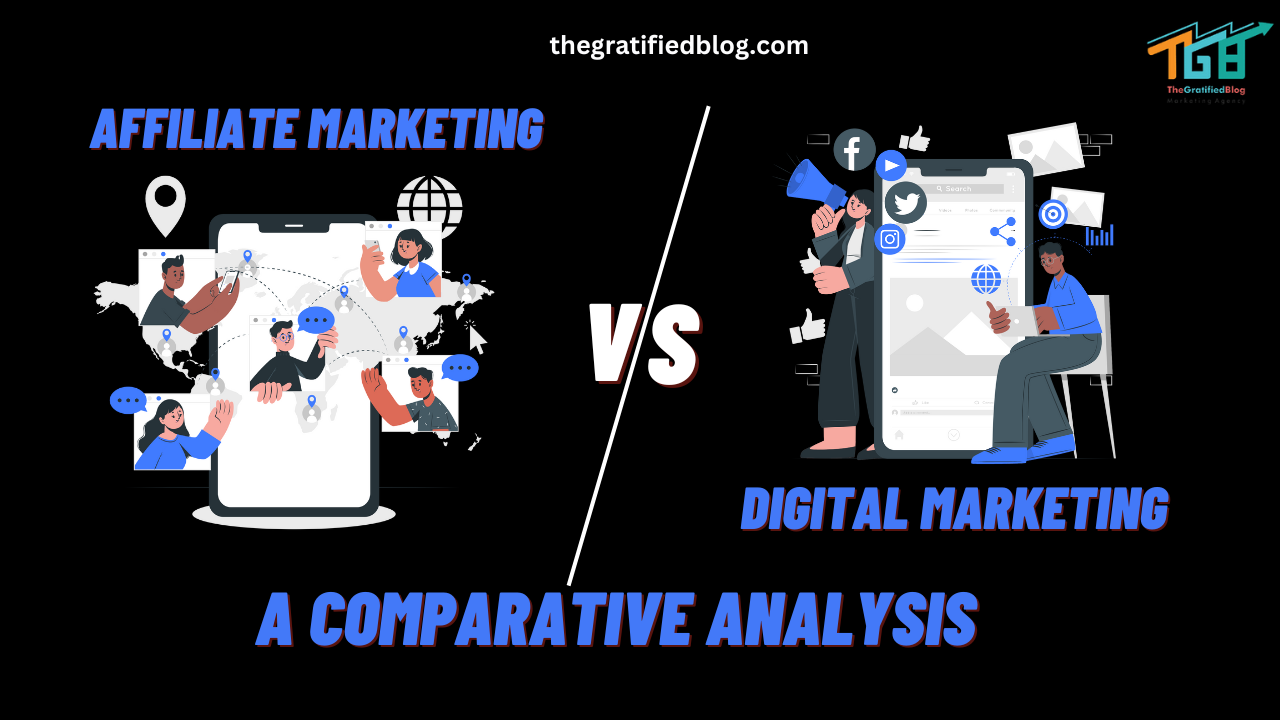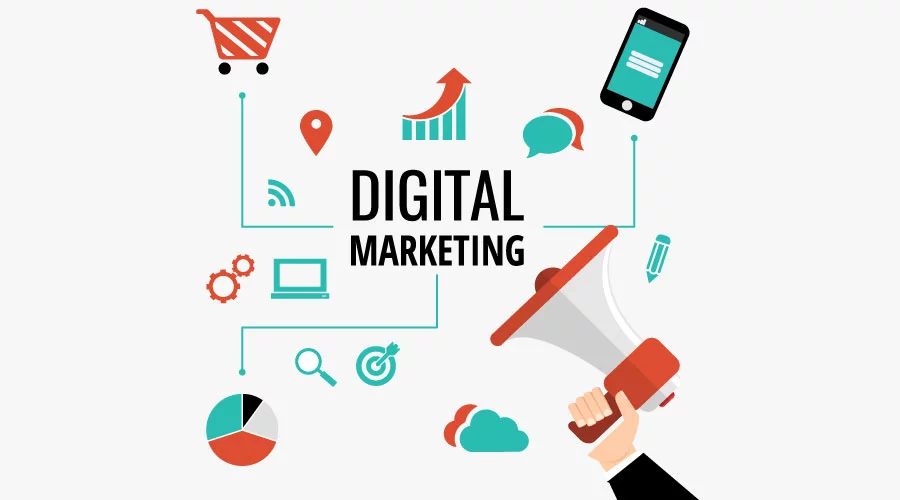
In today’s rapidly evolving digital landscape, businesses continually search for efficient methods to reach their target audience and generate revenue. Two popular strategies that have gained significant attention are affiliate marketing vs digital marketing. Both approaches have their merits, but they differ in execution, goals, and their roles in a company’s overall marketing strategy.
In this comparative analysis, we will delve into the intricacies of affiliate marketing and digital marketing to assist businesses in making well-informed decisions regarding which strategy, among these two, suits their needs best.
What Does Affiliate Marketing Entail?

Affiliate marketing is a performance-driven marketing strategy that involves businesses collaborating with individuals or other entities (affiliates) to endorse their products or services, with affiliates earning a commission for each sale, click, or lead they generate through marketing efforts.
This method leverages the power of collaboration, as affiliates often have their own websites, blogs, or social media channels where they can promote the products or services of the business they’re affiliated with.
Critical Features Of Affiliate Marketing:
- Performance-Based: Affiliate marketing rewards affiliates based on their performance. Commissions are typically earned When a particular action is accomplished, like a sale or generating a lead.
- Low Risk for Businesses: Businesses only pay affiliates when they produce results, making it a low-risk marketing strategy.
- Leverage Existing Audiences: Affiliates often have established audiences, which businesses can tap into to reach potential customers.
- Cost-Effective: Businesses can save on advertising costs as they only pay for successful conversions.
Types Of Affiliate Marketing

Unattached Affiliate Marketing
Unattached standalone or independent affiliate marketing involves promoting products or services without directly engaging with the audience or consumers.
In this model, affiliates typically create blog posts, reviews, or advertisements with affiliate links embedded.
The goal is to attract organic traffic and motivate users to engage with the affiliate links to make a purchase. Affiliates receive commissions depending on the sales generated via their unique affiliate links.
Related Affiliate Marketing
Related affiliate marketing, sometimes called niche affiliate marketing, involves promoting products or services closely aligned with the affiliate’s content or niche.
Affiliates in this category often have expertise or a strong interest in a specific industry or topic. They leverage their knowledge and authority to recommend relevant products or services to their audience.
This approach tends to result in higher conversion rates because the affiliate’s recommendations are seen as trustworthy and relevant.
Involved Affiliate Marketing
Involved affiliate marketing, also known as influencer affiliate marketing, entails affiliates actively engaging with their audience on various platforms, such as social media, YouTube, or podcasts.
These affiliates often build a personal brand and a loyal following, which makes their recommendations highly influential. They showcase products or services they genuinely use and believe in, fostering a sense of authenticity and trust with their audience.
Involved affiliates may use their unique affiliate links and earn commissions for each sale driven by their recommendations.
Each affiliate marketing type has advantages and strategies, catering to different affiliate preferences and target audiences. Affiliates often choose the approach that best aligns with their content, expertise, and audience to maximize their success in the affiliate marketing space.
What Is Digital Marketing?

Digital marketing encompasses various online marketing activities to promote products, services, or brands through digital channels.
These channels include Search engine optimization (SEO), email marketing, content marketing, social media marketing, pay-per-click (PPC) advertising, and various other strategies are involved in multiple different strategies. Various other strategies.
Digital marketing focuses on creating and maintaining an online presence to engage with and convert potential customers.
Critical Features Of Digital Marketing:
- Multifaceted: Digital marketing is a broad field that encompasses various strategies and tactics, allowing businesses to reach their target audience through multiple channels.
- Brand Building: It’s not just about making sales; digital marketing helps build and maintain a brand’s online reputation and presence.
- Long-Term Strategy: Digital marketing often involves ongoing efforts to establish authority and credibility in a niche.
Data-driven: Digital marketing relies heavily on data analytics to measure and optimize campaigns, making it highly adaptable and efficient.
Difference Between Affiliate Marketing Vs Digital Marketing
Affiliate and digital marketing are two distinct approaches to online marketing, each with its characteristics and strategies. Here are nine critical differences between them:
Purpose
Affiliate Marketing: In affiliate marketing, individuals or entities (affiliates) endorse products or services from other companies and earn a commission based on sales or leads.
This approach leverages the power of external partners to expand the reach and drive sales without the company’s direct involvement in marketing efforts.
Affiliates often use various online channels such as blogs, social media, or email marketing to promote products, making it a cost-effective strategy.
Successful affiliate programs require effective tracking and transparent communication between companies and affiliates to ensure mutual success.
Digital Marketing: Digital marketing encompasses a broader range of online marketing activities aimed at directly promoting a brand, product, or service by the company itself.
It utilizes a variety of channels like search engine optimization (SEO), pay-per-click advertising, email marketing, and social media to engage with a target audience.
Digital marketing offers companies greater control and customization over their promotional campaigns, enabling precise targeting and real-time performance measurement.
It is crucial in building brand awareness, directing traffic, and transforming leads into customers, making it an integral component of modern marketing strategies.
Ownership
Affiliate Marketing: Affiliates do not own the products or services they promote. They act as intermediaries, directing traffic and customers to the actual product or service owners.
Their role revolves around earning commissions for successful referrals. Ownership remains with the product/service creators, allowing affiliates to focus solely on marketing.
This model minimizes financial risk and inventory management for affiliates. They leverage their marketing skills to drive sales for others, benefiting from a commission-based compensation structure.
While they lack ownership, affiliates play a pivotal role in expanding the reach of businesses. Ultimately, ownership and control reside with the product/service providers.
Digital Marketing: In contrast, digital marketing involves companies directly owning and promoting their products or services. These businesses utilize various online channels and strategies to establish a solid online presence.
Digital marketing includes content marketing, SEO, social media marketing, and more, all under the company’s control. Companies have full authority over their marketing campaigns, branding, and messaging with direct ownership.
They can adapt strategies in real-time to align with their objectives. This autonomy allows for greater customization and control, ensuring a more direct connection with their target audience.
In digital marketing, ownership and management of promotional activities are firmly in the hands of the business itself.
Control
Affiliate Marketing: Affiliates have limited control over the products or services they promote, as they rely on the merchant’s offerings.
They can’t dictate product changes or pricing, often adapting to the merchant’s decisions. Commission rates are set by the merchant, restricting income potential.
Marketing materials are provided by the merchant, limiting creative input. Affiliates focus on promotion and driving traffic to the merchant’s site.
Tracking tools help measure performance, but the product itself remains unchanged. Affiliates adapt to market fluctuations and the merchant’s choices, highlighting their limited influence.
Digital Marketing: Companies fully control their marketing strategies, including branding, messaging, and campaign management. They set their goals budgets and tailor strategies to their unique needs.
Creativity flourishes in crafting compelling content and design. Pricing, product changes, and messaging are adjusted in real-time.
They can employ analytics to optimize campaigns and pivot swiftly. Companies actively shape their brand image and maintain flexibility in response to market dynamics.
In digital marketing, control is in the hands of the business, allowing for adaptable, data-driven decision-making.
Payment Model
Affiliate Marketing: Compensation in affiliate marketing is typically based on performance, such as a commission per sale, lead, or click.
This pay structure incentivizes affiliates to drive meaningful actions for the advertiser. It’s a performance-driven model, ensuring advertisers only pay for actual results achieved through the affiliate’s efforts.
The affiliate’s earnings directly correlate with their effectiveness in promoting the product or service. This dynamic approach fosters a mutually beneficial relationship between advertisers and affiliates, aligning their interests and advertising success.
Digital Marketing: Digital marketing costs can vary and may include expenses for advertising, content creation, and marketing tools, regardless of performance.
Advertisers invest in digital channels to increase brand visibility and engagement. Costs can accumulate rapidly, especially in competitive industries.
Advertisers must carefully manage budgets and measure ROI to ensure their digital marketing efforts generate profitable outcomes. This model differs from affiliate marketing, as expenses are incurred regardless of the results achieved.
Effective digital marketing strategies and budget allocation are essential for maximizing returns in this dynamic and evolving landscape.
Promotional Methods
Affiliate Marketing: Affiliates often use various promotional methods, including content marketing, email marketing, social media, and paid advertising, to channel traffic toward their affiliate links.
They leverage engaging blog posts, videos, and reviews to attract potential customers and earn commissions through referrals. YouTube, Instagram, and diverse social media platforms play a significant role in building their affiliate brand. At the same time, email newsletters help nurture relationships with their audience.
Utilizing channels like Google Ads and Facebook Ads for advertising enables affiliates to reach wider audiences and maximize their earnings. In this model, success is linked directly to conversions generated through their unique affiliate links.
Digital Marketing: Digital marketing employs a wide range of strategies, such as SEO, PPC advertising, Content marketing, social media marketing, email marketing, and additional strategies to promote products or services directly.
SEO optimizes website content for search engines, improving organic visibility. PPC advertising, such as Google AdWords, places paid ads at the top of search results.
Content marketing delivers valuable information to audiences, establishing authority and trust. Social media marketing leverages platforms like Facebook, Twitter, and LinkedIn to engage and convert followers.
Email marketing nurtures leads through personalized messaging. Combining these techniques, digital marketing creates a comprehensive approach to online promotion, enabling businesses to reach their target audiences effectively.
Target Audience
Affiliate Marketing: Affiliates usually focus on niche audiences interested in specific products or services. They seek to connect with consumers genuinely interested in their chosen niche, ensuring higher conversion rates.
This targeted approach allows affiliates to create personalized content and recommendations that resonate with their audience’s preferences, building trust and loyalty.
Digital Marketing: Companies can target a broader or more diverse audience, depending on their goals and offerings. To reach a broader demographic spectrum, digital marketing employs various channels, such as social media, search engine optimization, and email marketing.
This versatility allows businesses to adapt their messaging to cater to different segments, increasing brand visibility and market reach. The flexible approach will enable companies to pivot and experiment with audience-targeting strategies to achieve their objectives.
Risk And Investment
Affiliate Marketing: Affiliates often have lower upfront costs and lower risk since they don’t need to create products, handle inventory, or provide customer support.
This model allows for quick entry into the market with minimal financial commitment. However, affiliates rely on the affiliate program’s success, and their earnings can fluctuate based on sales performance. This reduces the financial risk but can make income less predictable.
Digital Marketing: Companies engaged in digital marketing may invest heavily in product development, inventory, and customer support, leading to higher initial expenses and risks.
While this approach allows for more control over the product and customer experience, it also demands substantial capital and carries the risk of market uncertainty and competition. Balancing investment with market demand becomes crucial in managing these risks effectively.
Long-Term Relationship
Affiliate Marketing: Relationships between affiliates and merchants can be short-term, based on individual campaigns or agreements.
These partnerships often revolve around specific product promotions, and the affiliate’s primary goal is to drive immediate sales. While short-term gains are possible, they need more depth of long-term connections.
Digital Marketing: Companies aim to build long-term customer relationships and may use various marketing strategies to foster customer loyalty.
These strategies encompass content marketing, email campaigns, and personalized experiences, all geared toward nurturing enduring customer connections.
Building trust, meeting evolving needs, and delivering consistent value are central to these efforts. Such enduring relationships contribute to sustained customer retention and business growth.
Measurement Of Success
Affiliate Marketing: Success is often measured by the number of sales, leads, or clicks generated through affiliate links. Tracking these key performance indicators (KPIs) allows affiliates to gauge their effectiveness and revenue potential.
High conversion rates and a growing audience signify prosperous affiliate marketing endeavors. Earnings per click (EPC) and commission payouts are additional yardsticks of accomplishment in this field.
Digital Marketing: Success metrics can vary widely and may include website traffic, conversion rates, customer acquisition costs, return on investment (ROI), and brand visibility.
Website traffic is a fundamental metric, indicating the reach of digital efforts. Conversion rates reveal how effectively visitors are transformed into customers. Monitoring customer acquisition costs ensures efficient spending, while ROI measures profitability.
Ultimately, strong brand visibility, recognized through online presence and engagement, contributes to the overall success of digital marketing campaigns.
Choosing The Right Strategy

The choice between affiliate marketing and digital marketing relies on the objectives of your business, available resources, and the characteristics of your target audience.
Businesses often combine both strategies to maximize their online presence and sales potential.
- Use Affiliate Marketing: Affiliate marketing can be cost-effective if you want to increase sales quickly and have a limited marketing budget. Having affiliates with a robust online presence in your niche is beneficial.
- Use Digital Marketing: When your goals include building a solid brand presence, engaging with a diverse audience, and creating a long-term online strategy, digital marketing is the way to go. It offers more control and flexibility in shaping your online presence.
Also read: Comparison between Content marketing vs digital marketing
Conclusion
There is no one-size-fits-all answer in affiliate marketing vs. digital marketing. Both approaches have unique strengths and weaknesses, and their suitability depends on a business’s specific goals, resources, and target audience.
Affiliate marketing is an appealing choice for businesses seeking a low-risk, performance-based model that can quickly tap into existing audiences. On the other hand, digital marketing offers versatility, control, and the ability to build a strong brand presence online.
Businesses often combine both strategies to maximize their online reach and engagement. Ultimately, the choice between affiliate marketing and digital marketing should be driven by a well-defined marketing strategy and a clear understanding of the target market’s preferences and behavior.








No Comments